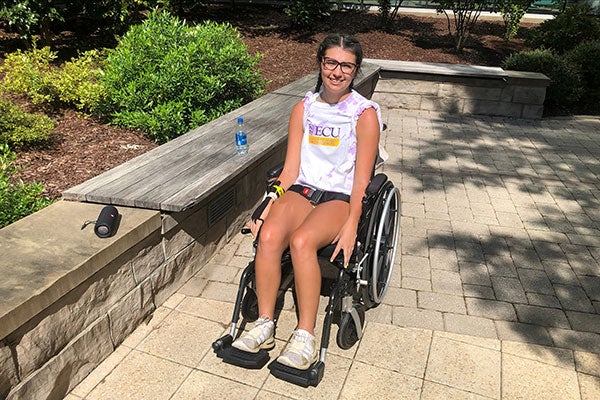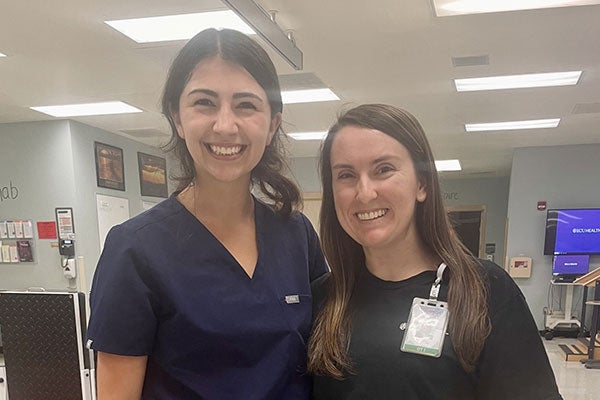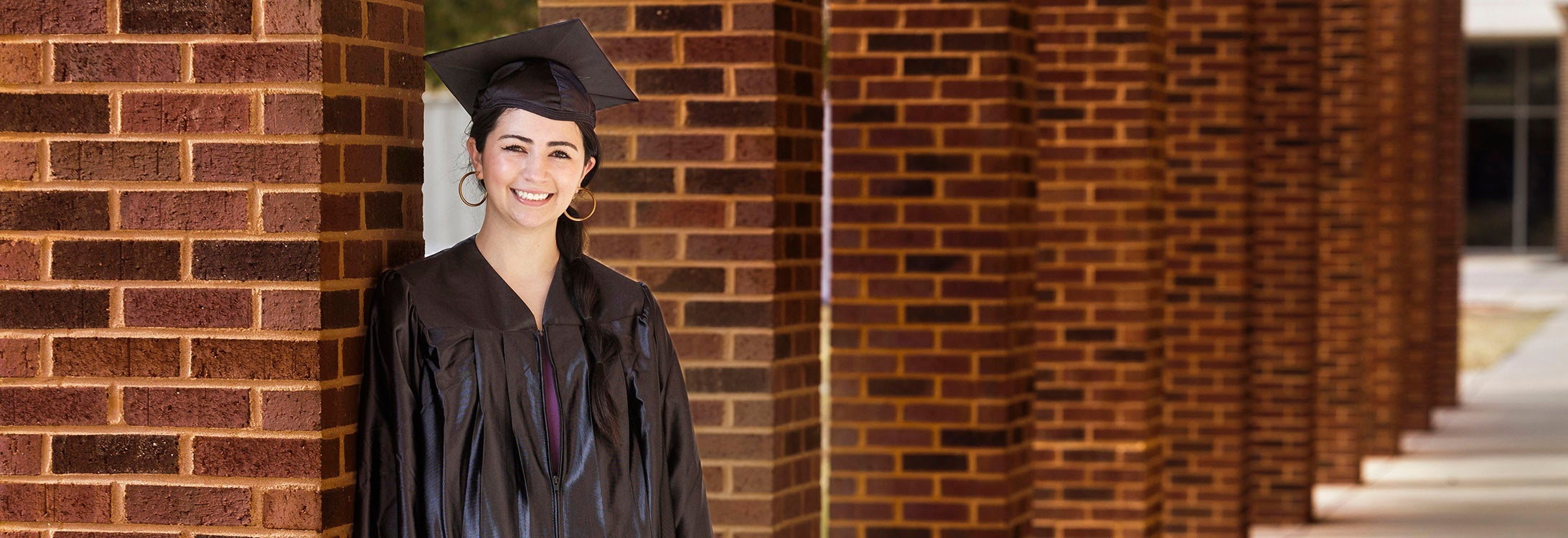Brain injury not enough to keep OT student from achieving her goals
Charlotte Pete knew since middle school that she wanted to be an occupational therapist and arrived in Greenville intent on graduating from the program.

Charlotte Pete dreamed of being an occupational therapist from a young age. She overcame a brain injury to graduate from ECU.
She was at the top of her class when she began East Carolina University’s occupational therapy program in 2020, just as the world was beginning its cautious reemergence from being barricaded in response to the COVID-19 pandemic.
On the first day of the second year of the program, she couldn’t get out of bed. She had a terrible headache and couldn’t stop vomiting. Friends from the program stopped by to check on her and ensure she was getting enough fluids.
It was a clear case of food poisoning — until her symptoms lasted three days. Doctors at the ECU Health Medical Center ordered an MRI.
“They discovered my brain was swelling and they weren’t really sure of the cause. I had COVID two or three weeks before but had fully recovered,” Pete said.
Her medical team had read research that said brain swelling was possible from a COVID-19 infection, but none had seen it themselves, Pete said. She was treated with steroids and when that didn’t help, her doctors contacted Duke Hospital. The doctors there said they would be willing to take her on and she was transferred to Durham.
Once she got to Duke, she was very sick but thought in a week or so things would turn around.
At some point during her hospital stay, she developed a severe case of ataxia — a loss of control of her movements — as well as her ability to speak. She was stuck in a hospital bed unable to change the TV channels or push the buttons on her phone and was unable to communicate those struggles.
“I had to use a wheelchair, and I could hardly brush my hair,” Pete said. “After four days they said there was nothing more they could do for me medically and now they say I’m probably as good as I’m going to get.”
The medical staff at the hospital recommended she undergo a heavy program of physical, occupational and speech therapy and transferred her to an inpatient rehabilitation facility.
“Everything in my head sounds like before the brain injury, but when it comes out, it’s different than I want. I have done a huge amount of speech therapy, and my voice is better than it used to be, but I don’t think it will ever be the same as it was before,” Pete said.
Pete was forced to withdraw from her graduate program — she just couldn’t do the work — but her determination to return to the program never wavered.
“I told myself that if I don’t reapply to the program, I’ll regret it my whole life,” Pete said, and set about getting herself in shape to get back into the classroom.
Support from Family and Friends
Pete’s parents were crucial to her recovery. Her father would often work all day and drive straight to the hospital where he would sleep on uncomfortable chairs before driving back to work without going home each morning. Her mother would often trade nights in the hospital with her father, a bit of payback for the recovery help Pete gave in her second year at UNC Chapel Hill, when her mother took a nasty tumble down a set of stairs, causing some spinal cord damage.
Being a caregiver for her mother was an important step in cementing her commitment to applying for ECU’s occupational therapy program.
“I learned patience and creative problem-solving skills, and I also realized my ability to be a cheerleader for someone,” Pete said. “She was really afraid of going up and down stairs, but we would spend two hours every day going up and down stairs and I would be right there behind her.”
Pete said her physical condition will likely never be the same as it was before, but it has greatly improved due to the help of her brother Andrew, who is a personal trainer. She said they would go to the gym together when she was finally strong enough to take on the challenge of recovery. Because he knew the exercises that would improve her ataxia, Pete said her recovery sped along.
Dr. Shanna Garcia, a clinical assistant professor of OT and the department’s academic fieldwork coordinator, said Dr. Young Kim, Pete’s advisor, stayed in close contact with Pete through her rehabilitation and her peers visited the hospital multiple times.
“There were a group of students, her first cohort that graduated in 2023, who were probably one of the most tight-knit cohorts that we have seen come through our program. They were so supportive through it all, and when she came back into classes, they were a constant source of support for her,” Garcia said.
Faculty Support
Pete’s return to the classroom, and her eventual fieldwork experiences, happened largely due to her tenacity, but couldn’t have worked without the dedication and buy-in from the faculty of the OT department and the office of Disability Support Services.

Charlotte Pete, left, and Taylor Fleming, her fieldwork preceptor, pose during a break in between caring for patients at ECU Health Medical Center. (Contributed photo).
“Part of our charge is to make sure that the students are meeting the core elements of the curriculum, the standards,” Garcia said. “That took a lot of forethought and planning, and Charlotte was instrumental in that.”
Assigning fieldwork placements, where students put their training into practice, is a complex process, Garcia said. Students’ aptitudes and desires are considered and honored, but sometimes faculty help steer students to settings that will best help them to achieve their career-long goals.
For Pete, returning mid-program with new needs, this process had to be approached in a unique way. The first step was seeing Pete function in the department’s student-run clinic, a pro-bono opportunity for members of the Greenville area who need OT support but are not covered by insurance.
Pete’s time in the clinic was relatively short, but she proved herself.
“We very intentionally placed her there. We worked hand in hand with her throughout the whole semester, and we saw some of the potential barriers or limitations that we might need to seek accommodations for. Charlotte was so good at being able to sit down and hear her fieldwork educator’s feedback, and really reflect on what her needs were,” Garcia said.
Rachel Taylor, a clinical assistant professor of occupational therapy, said Pete was one of the most adaptable students she had ever worked with in the clinic.
“She was always willing to think on her feet to meet the patient’s needs. I saw her be able to connect with patients in a unique way because of her personal experiences,” Taylor said. “Once when she was shadowing me in inpatient rehabilitation, I witnessed her empathy with a patient during a difficult time, using her own story to inspire the patient to keep going with their therapy session. It was truly an incredible moment to be a part of.”
With a test run at providing clinical care, and a clear-eyed assessment of the challenges she might face, Pete and her support team at ECU felt confident she was ready to move into the real world.
Using Her Training
Taylor Fleming, an inpatient occupational therapist at ECU Health Medical Center, had Pete as her first student trainee. But she had to take some time to consider the request to bring Pete on for her fieldwork.
“I was honored that they thought of me, that she’d be a good fit here. I took a couple of weeks to think about it and then I said, ‘OK, let’s do it,’” Fleming said.
Pete quickly won Fleming over with the dedication, passion and time that she invested into each of the patients she worked with, but it took about six weeks for her to fully emerge from her shell. Once she did, Pete took wing, Fleming said.
“I have no idea how many outside hours she put into this place because she truly cared about the well-being of our patients — wanting to do her best, to be her best,” Fleming said.
Fleming said Pete’s OT future won’t be without challenges. Her speech has greatly improved, as has her physical strength and coordination, but there are still accommodations that she is learning to make to physically deliver the therapeutic care that she has mastered through her coursework.
“Working with patients, transferring them, didn’t really work the best for her, so I would give her pointers. She ultimately figured out, ‘Alright, I feel better if I’m on this side of the patient for my center of balance — my overall safety — as well. This feels best,’” Fleming said.
Fleming echoed the other OT leaders who have helped shape Pete’s training in saying she is a tremendously caring and thoughtful person. Pete would send Fleming random text messages apologizing for the time it took for her to accomplish tasks, apologies that were completely unnecessary but showed her professionalism, Fleming said.
“And at the end of her time with me, she would handwrite little notes which, for her, is a huge feat. One of the things that the brain injury took from her was her ability to write fluidly, so knowing that she took the time to do that for me meant a lot,” Fleming said.
Field Work
Rod Passell is an experienced occupational therapist, having worked at the Caswell Development Center in Kinston for more than three decades. Caswell is one of three state-run residential facilities that caters to the needs of North Carolinians with intellectual disabilities, one of the oldest facilities of its kind in the nation.
The facility is a small community with 24-hour nursing care, doctors, a range of resident therapeutic services and even its own barber shop. Passell said because Caswell is state-run and doesn’t require billing for services, more time and attention can be paid to the needs of residents, which is a wonderful training ground for OT students, where they can provide creative and individualized care for residents.
Passell got a call from Garcia, the OT program’s clinical coordinator, looking for some special help with a student who was one of the smartest and most capable she had taught, but who needed some time and patience during her recovery that most outpatient clinics could support.
Passell said he would give her a chance, but she had to keep up. The first day of Pete’s field work, he took her on a tour of the 365-acre grounds — to see if she could endure the walking that would be necessary.
“She came out here and did a really excellent job keeping up with me and working with the individuals I was assisting. So, I told Shanna, ‘OK, I’ll take her for three months,’” Passell said.
Passell said the first weeks of Pete’s field work weren’t easy — it took time for her to get comfortable speaking to strangers and her fine motor skills continued to be a challenge, but she quickly overcame those and proved her unflagging motivation.
“She’s in the top 5% of students I’ve supervised in terms of motivation, intellect, clinical skills and reasoning. She remembers things that I don’t remember anymore,” Passell said.
Moving Forward
Pete’s recovery isn’t complete, and she’s come to accept that she’ll probably never be the same as before her health crisis. When she speaks, she can be loud and the words are enunciated staccato, but her mind is fully intact, which is most important for her to keep a positive attitude and push through the difficult days.
“That was hard to cope with, always thinking I would make a full recovery and return to the person I was and then realizing this may be permanent. I decided to always be as positive as I can because there’s no point in being negative,” Pete said. “I always tell myself you can’t control what happens to you, you can only control how you respond. So, I’m choosing to respond in the most positive way I can.”
After years of knowing exactly what she wanted to do with her life, getting into the ECU OT program and coming so close to losing it all, Pete said graduation will mark a significant achievement.
“I really didn’t think I would be able to graduate and make it through the program. It’s going to be so emotional; I think I will actually cry,” Pete said.
“The biggest thing I’ve learned is, it’s all about your belief in yourself. Now that I’ve seen everything I’ve accomplished, I have a newfound belief in myself. I know everything will work out for me.”
